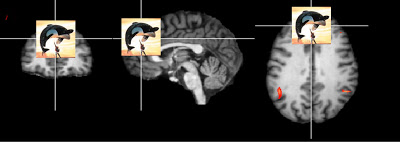Neuroscience

No...wait...
Footnotes
1That's actually the title of the original article by Brass and Haggard (2007). More about it in the next post.
2Unlike the headline (as usual), which is probably not the reporter's fault.
- Libet Redux: Free Will Takes Another Hammering
The scientist Benjamin Libet shocked the world in 1985 when he published research showing that preparatory brain activity occurs several hundred milliseconds prior to when people consciously choose to move. His experiment suggested free will is an illusion....
- Brain Scan Can Read Your Intentions
Researchers have shown they can read a person's intentions from the patterns of activity in the front of their brain. John-Dylan Haynes and colleagues said their findings could have important technical and clinical applications, “such as the further...
- Imaging The Brain To Control The Mind
For the first time anywhere in the world, psychologists at California-based company Omneuron and Stanford University have demonstrated that people can be taught how to reduce their experience of pain with the aid of real-time images of their brain activity....
- Are Daydreams Different In Autistic Minds?
Here's another one all over the news but not yet posted by PNAS. PEOPLE with autism seem not to daydream in the way that other people do. When the minds of non-autistic people are "idle", a network within the brain...
- Hoarding Behavior In Brain Damage
From a University of Iowa press release:Brain Region Identified That Controls Collecting Behavior [snip] By studying patients who developed abnormal hoarding behavior following brain injury, neurology researchers in the University of Iowa Roy J....
Neuroscience
Scientists Spot Brain's 'Free Willy' Center

No...wait...
Scientists Spot Brain's 'Free Will' Center...doesn't this suggest the existence of two 'free will' centers [to do or not to do]1? And how was this demonstrated?
It helps people refrain from actions good and bad, experts say.
By Amanda Gardner
HealthDay Reporter
THURSDAY, Aug. 23 (HealthDay News) -- If you've ever been of "two minds" about doing something, a new study may explain why.
Scientists say one part of the brain is responsible for initiating action, while a totally separate area is in charge of not taking that action.
This newly identified region, involved in an aspect of self-control, may change conceptions of human free will, the researchers said. It could also explain the basis of impulsive as well as reluctant behavior, they added.
Using functional magnetic resonance imaging (fMRI), the researchers studied the brain activity of participants in two situations -- when they acted out as they had planned, or when they decided not to follow their original intention.In a surprising show of moderation and restraint in interpreting the results2, the HealthDay article concludes:
Fifteen right-handed individuals ... participated in a "go-no-go" exercise. They were asked to press a button on a keyboard but first to indicate what time they were going to perform this action. They were also asked to choose instances in which they stopped before actually pressing the button.
When participants decided not to press the button, a specific area of the frontal lobe region of the brain lit up. When participants followed through, however, the area did not light up.
For now, the implications of the research are esoteric but, down the line, who knows?
Footnotes
1That's actually the title of the original article by Brass and Haggard (2007). More about it in the next post.
2Unlike the headline (as usual), which is probably not the reporter's fault.
- Libet Redux: Free Will Takes Another Hammering
The scientist Benjamin Libet shocked the world in 1985 when he published research showing that preparatory brain activity occurs several hundred milliseconds prior to when people consciously choose to move. His experiment suggested free will is an illusion....
- Brain Scan Can Read Your Intentions
Researchers have shown they can read a person's intentions from the patterns of activity in the front of their brain. John-Dylan Haynes and colleagues said their findings could have important technical and clinical applications, “such as the further...
- Imaging The Brain To Control The Mind
For the first time anywhere in the world, psychologists at California-based company Omneuron and Stanford University have demonstrated that people can be taught how to reduce their experience of pain with the aid of real-time images of their brain activity....
- Are Daydreams Different In Autistic Minds?
Here's another one all over the news but not yet posted by PNAS. PEOPLE with autism seem not to daydream in the way that other people do. When the minds of non-autistic people are "idle", a network within the brain...
- Hoarding Behavior In Brain Damage
From a University of Iowa press release:Brain Region Identified That Controls Collecting Behavior [snip] By studying patients who developed abnormal hoarding behavior following brain injury, neurology researchers in the University of Iowa Roy J....
